Feb 18 2010
Call them oil droplets with a brain or even "chemo-rats." Scientists in Illinois have developed a way to make simple oil droplets "smart" enough to navigate through a complex maze almost like a trained lab rat.
 Simple oil droplets (in red) can navigate a complex maze using a special chemical approach that could lead to improved delivery of anti-cancer drugs. (Credit: American Chemical Society)
Simple oil droplets (in red) can navigate a complex maze using a special chemical approach that could lead to improved delivery of anti-cancer drugs. (Credit: American Chemical Society)
The finding could have a wide range of practical implications, including helping cancer drugs to reach their target and controlling the movement of futuristic nano-machines, the scientists say.
Their study is in the weekly Journal of the American Chemical Society.
Bartosz Grzybowski and colleagues note that the ability to solve a maze is a common scientific test of intelligence. Animals ranging from rats to humans can master the task. Scientists would like to pass along that same ability to anti-cancer drugs, for instance, to help these medications navigate complex mazes of blood vessels and reach the tumor.
The scientists describe an advance in that direction. They developed postage-stamp-sized mazes, and infused them with an alkaline solution, and placed a gel containing a strong acid at the exit. That created a pH gradient, a difference between the acid-alkaline levels. Oil droplets containing a weak acid placed at the entrance of the mazes developed convective flows in response to pH differences and propelled themselves along the gradient toward the exit. Since cancer cells are more acidic than other body cells, the experiment may serve as a model for designing new anti-cancer drugs that move along similar acid-based gradients to target diseased cells, the scientists suggest.